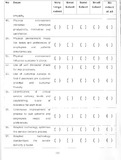| dc.description.abstract | Competition in hospitals both private and public in Kenya has become stiff.
Hospitals therefore need to differentiate their services to remain
competitive. The study objectives were to determine the extent to which
service differentiation strategies have been adopted in private hospitals
and determine the challenges of adopting these strategies.
This was a descriptive survey. The population of interest included all the
private hospitals in Nairobi. According to the Kenya Medical and Dentist
Practitioners directory of 2004 there were 48 private hospitals in Nairobi. A
census study was conducted. Data was collected using semi-structured
questionnaires which were administered using the drop and pick later
method. Marketing managers or any other person entrusted with the
hospitals' marketing activities of each hospital were studied.
The response rate was 63%. Data was analyzed using frequencies,
percentages, mean scores and standard deviation. The findings indicated
that of the three service differentiation strategies, that is, service offering,
service delivery and image, the hospitals performed best on service
delivery as a strategy, which tended to be practiced to a great extent
consistently across the industry. Image and service offering dimensions
were adopted to a lesser extent. It is also evident from the findings that
most of the service differentiation dimensions in each of the three
strategies were positively correlated with hospital size. This implies that
hospitals that were considered to be big in terms of having a bed capacity
of 70 and above adopted service differentiation strategies to a greater
extent than their counterparts with lower bed capacities (less than 70).
The main challenges faced in adopting the differentiation strategies
included; marketing activities being crowded by operations, difficulties in
controlling customer interface, restrictive regulations for advertising,
problems of growth, difficulties in improving productivity without
compromising on quality, among others.
The researcher also recommended that there is need for dedicated
departments to deal with marketing activities so as to improve on the
marketing orientation of hospitals which would in turn help in crafting of
the service differentiation strategies. Service delivery and service offering
strategies could be adopted to a larger extent if formal market research is
done so as to design services that are suitable to specific target markets.
The limitation of the study was that the survey was based on only private
hospitals in Nairobi. A more regional representation would have provided
better results. The researcher recommended that a study should be
conducted to cover both private and public hospitals in Kenya as well as
health management organizations (HMOs). | en |

